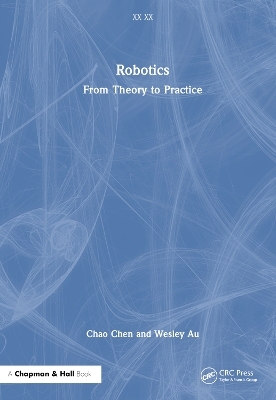
Robotics
Chapman & Hall/CRC (Verlag)
978-1-032-33099-0 (ISBN)
- Noch nicht erschienen (ca. Juli 2025)
- Versandkostenfrei
- Auch auf Rechnung
- Artikel merken
This textbook covers the fundamental theorems and analysis of robotic manipulators and their state-of-the-art applications that have revolutionised their respective industries.
This book is split into three parts, covering Fundamental, Advanced, and Research and Case Study topics of robotics.
Fundamental topics cover minimally-required knowledge to study and analyse robots, i.e., planar kinematic analysis, trajectory generation, and basic control, preparing readers with zero or minimum background knowledge for a more comprehensive study of robotics fundamentals.
Advanced topics cover classical analysis with state-of-the-art algorithms that make modern robotics intelligent, covering kinematic analysis, force-domain study, and path planning. The robotic manipulator of interest also extends beyond conventional rigid-link robots to address soft and under-actuated robots.
Research and Case Study topics establish the link between the fundamental theorems of robotics, with their successful robotic applications that have revolutionised the medical, manufacturing, and agricultural industries. These state-of-the-art topics and case studies provide context for all earlier topics introduced in the textbook, which brings the student to the leading edge of robotics research and applications in the industry.
Each aspect of robotics is introduced in a way that is easy for students of all levels to grasp and master, guiding the reader through the classical theorems, mathematical methods, and analytical tools necessary to analyse the designs of well-known robotic manipulators.
Each chapter includes worked examples, many with realistic applications that establish the link between the fundamental theorems of robotics, with their successful robotic applications.
This book can be used by undergraduate and postgraduate students in engineering, particularly in robotics and mechatronics, mechanical, and relevant. Engineers and researchers (non-university) can also refer to this book concerning robotics and mechatronics applications in manufacturing, medical robotics, agriculture, and automation, will
Associate Professor Chao Chen Associate Professor Chao Chen received his Bachelor degree in Mechanical Engineering at Shanghai Jiao Tong University in 1996, and Master and Ph.D. Degrees in Robotics at McGill University in 2002 and 2006, respectively. He received the FQRNT Postdoctoral Fellowship and worked at University of Toronto from 2006 to 2007. Chen joined the Department of Mechanical and Aerospace Engineering at Monash University in 2007, and has been teaching Robotics as a fourth-year subject since then. He also serves as the Course Director of Robotics and Mechatronics. Chen established the Laboratory of Motion Generation and Analysis, with the goal to improve the quality of life of people by smart robotic technology. His research interest is in the frontier robotic technologies with applications in space, agriculture, and medicine. Dr. Wesley Au Dr. Wesley Au received his Bachelor’s degree in Mechatronics Engineering and Applied Mathematics in 2010, and then his Ph.D. in Robotics in 2015 at Monash University, specialising in robot kinematics and path planning. He then joined University of Technology Sydney as a research fellow, developing design methodologies and planning strategies for infrastructure maintenance robots, before rejoining Monash University in 2019 to lead A/Prof Chen’s research team on agricultural robots. During this period, he provided teaching assistance and helped develop new coursework for Chen’s Robotics courses. Wesley has since transitioned to industry-based research, joining Boeing Research and Technology Australia in 2022 to leverage his expertise in robotics in supporting cutting-edge automation research for manufacturing in the aerospace industry.
Part 1: The Fundamentals 1. Introduction 2. Spatial Transformation 3. Direct Kinematics 4. Inverse Kinematics 5. Velocity Analysis 6. Lagrangian Dynamics 7. Newton-Euler Dynamics Part 2: Motion Planning and Control 8. Trajectory Generation 9. Path Planning 10. Joint Control 11. Nonlinear Control 12. Force Control 13. Programming
| Erscheint lt. Verlag | 25.7.2025 |
|---|---|
| Reihe/Serie | xx xx |
| Zusatzinfo | 5 Tables, black and white; 300 Line drawings, black and white; 13 Halftones, black and white; 142 Illustrations, black and white |
| Sprache | englisch |
| Maße | 178 x 254 mm |
| Themenwelt | Informatik ► Theorie / Studium ► Künstliche Intelligenz / Robotik |
| Technik | |
| Weitere Fachgebiete ► Land- / Forstwirtschaft / Fischerei | |
| ISBN-10 | 1-032-33099-6 / 1032330996 |
| ISBN-13 | 978-1-032-33099-0 / 9781032330990 |
| Zustand | Neuware |
| Informationen gemäß Produktsicherheitsverordnung (GPSR) | |
| Haben Sie eine Frage zum Produkt? |
aus dem Bereich


